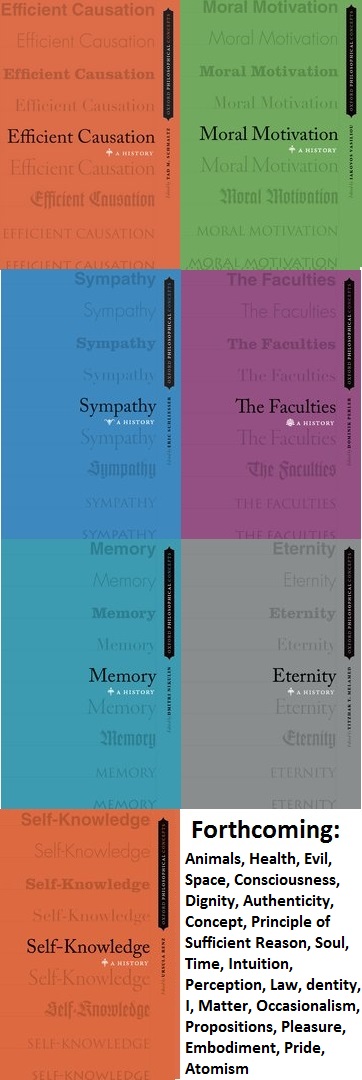Spinoza in de serie Oxford Philosophical Concepts
N.a.v. het blog van gisteren, waarin ik verwees naar ’t boek van Ursula Renz, Die Erklärbarkeit von Erfahrung (2010), waarover ze meedeelde dat het vertaald ging worden en bij OUP zou verschijnen, ging eens kijken of het daar al aangekondigd werd. Er was niets over te vinden, maar wel dat in januari 2017 een door haar geredigeerd werk zou verschijnen in de reeks Oxford Philosophical Concepts. Dat werd voor mij aanleiding eens na te gaan of en welke aandacht aan Spinoza in die reeks gegeven werd. Daarover dit overzichtje.
De serie staat onder redactie van
Christia Mercer en Gustave M. Berne.
The goal of Oxford Philosophical Concepts is to offer historically sound
accounts of central concepts in the history of philosophy. Each volume is a
history of its concept written by eminent scholars. Each traces the concept’s
original inception through its transformations to its modern use. Each presents
the underlying problems that the concept was supposed to solve and explains how
approaches to the concept – and sometimes the concept itself – shifted in order
to solve those problems. Each volume’s editor is responsible to set its focus,
gather the best international scholars as contributors, and organize a workshop
for its authors. Volumes include lexicons and thorough indices. [cf.]
• Tad M. Schmaltz (Ed.), Efficient Causation. A History. OUP, 13 November 2014
Martin Lin Chapter 6. Efficient Causation in Spinoza and Leibniz; books.google
• Iakovos Vasiliou (Ed.), Moral Motivation. A History. OUP, 10 September 2015
Steven Nadler Chapter 5. Act and Moral Motivation in Spinoza – books.google
• Eric Schliesser (Ed.), Sympathy. A History. OUP, Oct 2015 [cf. blog]
Karolina Hübner Chpt 5. Spinoza's Parallelism Doctrine and Metaphysical Sympathy – books.google
Ryan Hanley Chpt 6. The Eighteenth-Century Context of Sympathy from Spinoza to Kant – books.google
• Dominik Perler (Ed.), The Faculties. A History. OUP, July 2015
Stephan Schmid, Chapter 4: Faculties in Early Modern Philosophy - met daarin, zo laat books.google zien, een paragraaf 3. Baruch de Spinoza: Faculties as Powerful Ideas, p. 163 – 173
• Dmitri Nikulin (Ed.), Memory. A History. OUP, 10 September 2015
Heeft helemaal niets over Spinoza! Wat opvallend is.
Stephen Clucas Chapter 3. “Memory in the Renaissance and Early Modern Period,” heeft helemaal niets over Spinoza te zeggen. Een misser, ook van de serieredactie, dunkt me.
Deze maand zou verschijnen:
• Yitzhak Y. Melamed (Ed.), Eternity. A History, OUP, August 2016
Yitzhak Y. Melamed, Editorial Introduction [academia.edu]
Yitzhak Y. Melamed Chapter 3, Eternity in Earl Modern Philosophy.
§ 4 Spinoza on Eternity as Self-Necessitated Existence – books.google
§ 5 The Reception of Spinoza's Concept of Eternity as Self-Necessitated Existence - books.google
• Ursula Renz, Self-Knowledge. A History. OUP, 26 January 2017 (Estimated)
Spinoza wordt, i.t.t. andere filosofen, niet bij naam genoemd in de hoofdstukken, maar verwacht mag worden dat
Ursula Renz in Chapter 8. Socratic Self-Knowledge in Early Modern Philosophy
Aaron Garrett in Chapter 9. Self-Knowledge and Self-Deception in Modern Moral Philosophy
wel flink aandacht aan onze filosoof zullen geven.
Er komen op kortere termijn nog delen over: Evil, Health, Space, Animals, Consciousness, Pleasure, Dignity, en op de langere tijd nog meer.


